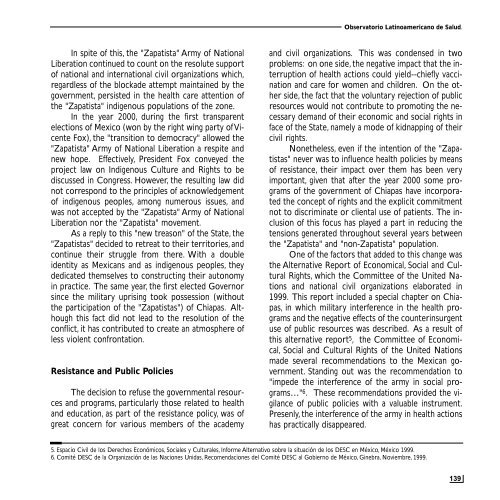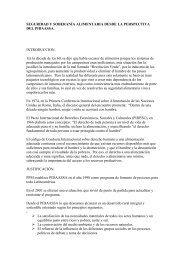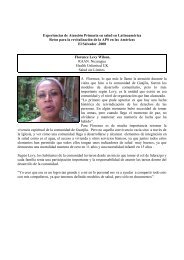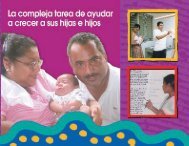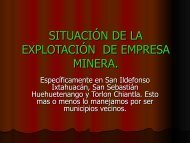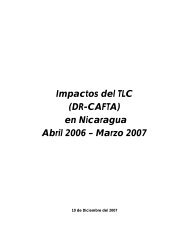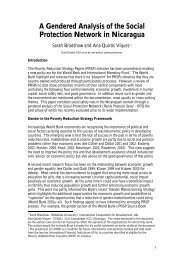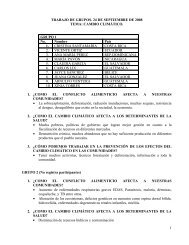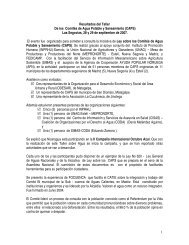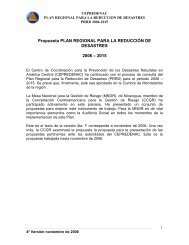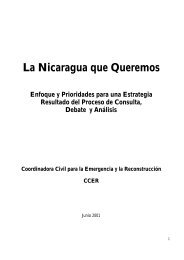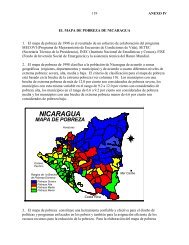Download - CISAS | Centro de Información y Servicios de AsesorÃa ...
Download - CISAS | Centro de Información y Servicios de AsesorÃa ...
Download - CISAS | Centro de Información y Servicios de AsesorÃa ...
You also want an ePaper? Increase the reach of your titles
YUMPU automatically turns print PDFs into web optimized ePapers that Google loves.
Observatorio Latinoamericano <strong>de</strong> Salud.In spite of this, the "Zapatista" Army of NationalLiberation continued to count on the resolute supportof national and international civil organizations which,regardless of the blocka<strong>de</strong> attempt maintained by thegovernment, persisted in the health care attention ofthe "Zapatista" indigenous populations of the zone.In the year 2000, during the first transparentelections of Mexico (won by the right wing party of VicenteFox), the "transition to <strong>de</strong>mocracy" allowed the"Zapatista" Army of National Liberation a respite andnew hope. Effectively, Presi<strong>de</strong>nt Fox conveyed theproject law on Indigenous Culture and Rights to bediscussed in Congress. However, the resulting law didnot correspond to the principles of acknowledgementof indigenous peoples, among numerous issues, andwas not accepted by the "Zapatista" Army of NationalLiberation nor the "Zapatista" movement.As a reply to this "new treason" of the State, the"Zapatistas" <strong>de</strong>ci<strong>de</strong>d to retreat to their territories, andcontinue their struggle from there. With a doublei<strong>de</strong>ntity as Mexicans and as indigenous peoples, they<strong>de</strong>dicated themselves to constructing their autonomyin practice. The same year, the first elected Governorsince the military uprising took possession (withoutthe participation of the "Zapatistas") of Chiapas. Althoughthis fact did not lead to the resolution of theconflict, it has contributed to create an atmosphere ofless violent confrontation.Resistance and Public PoliciesThe <strong>de</strong>cision to refuse the governmental resourcesand programs, particularly those related to healthand education, as part of the resistance policy, was ofgreat concern for various members of the aca<strong>de</strong>myand civil organizations. This was con<strong>de</strong>nsed in twoproblems: on one si<strong>de</strong>, the negative impact that the interruptionof health actions could yield--chiefly vaccinationand care for women and children. On the othersi<strong>de</strong>, the fact that the voluntary rejection of publicresources would not contribute to promoting the necessary<strong>de</strong>mand of their economic and social rights inface of the State, namely a mo<strong>de</strong> of kidnapping of theircivil rights.Nonetheless, even if the intention of the "Zapatistas"never was to influence health policies by meansof resistance, their impact over them has been veryimportant, given that after the year 2000 some programsof the government of Chiapas have incorporatedthe concept of rights and the explicit commitmentnot to discriminate or cliental use of patients. The inclusionof this focus has played a part in reducing thetensions generated throughout several years betweenthe "Zapatista" and "non-Zapatista" population.One of the factors that ad<strong>de</strong>d to this change wasthe Alternative Report of Economical, Social and CulturalRights, which the Committee of the United Nationsand national civil organizations elaborated in1999. This report inclu<strong>de</strong>d a special chapter on Chiapas,in which military interference in the health programsand the negative effects of the counterinsurgentuse of public resources was <strong>de</strong>scribed. As a result ofthis alternative report 5 , the Committee of Economical,Social and Cultural Rights of the United Nationsma<strong>de</strong> several recommendations to the Mexican government.Standing out was the recommendation to"impe<strong>de</strong> the interference of the army in social programs…"6 . These recommendations provi<strong>de</strong>d the vigilanceof public policies with a valuable instrument.Presenly, the interference of the army in health actionshas practically disappeared.5. Espacio Civil <strong>de</strong> los Derechos Económicos, Sociales y Culturales, Informe Alternativo sobre la situación <strong>de</strong> los DESC en México, México 1999.6. Comité DESC <strong>de</strong> la Organización <strong>de</strong> las Naciones Unidas, Recomendaciones <strong>de</strong>l Comité DESC al Gobierno <strong>de</strong> México, Ginebra, Noviembre, 1999.139


